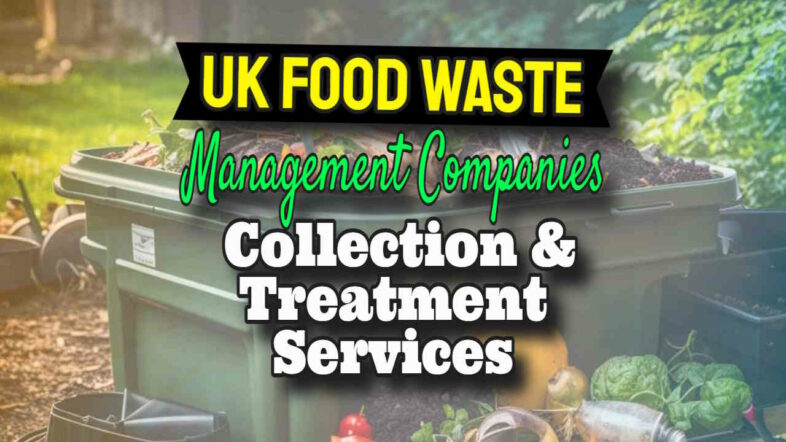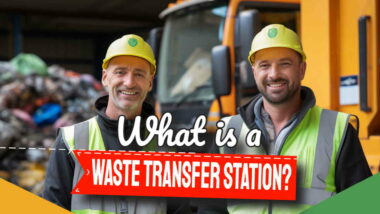This article discusses UK food waste management companies and the food waste collection and treatment services they offer.
Waste management is a pressing concern, and one area that’s often overlooked is food waste. Did you know 70% of food waste comes from households alone? This article will delve into the role of food waste management companies, detailing the collection and treatment services they provide to tackle this issue.
Ready to discover how these services can aid sustainability while cutting costs? Let’s dive right in!
Key Takeaways
- Food waste management companies offer collection and treatment services to address the pressing issue of food waste, with 70% of it coming from households alone.
- These companies provide composting services, which transform organic matter into nutrient-rich soil conditioners, reducing the need for chemical fertilizers and capturing harmful gases during decomposition.
- Anaerobic digestion is another service offered by food waste management companies. This process breaks down organic waste in an oxygen-free environment to create biogas used as a renewable energy source.
- By utilizing these services, businesses can reduce their disposal costs, generate revenue, conserve valuable resources like water and energy, and contribute to a more sustainable future.
Importance of Food Waste Management
Food waste management is crucial due to its environmental impact, cost-saving potential, and the conservation of valuable resources.

Environmental impact
Food waste significantly contributes to greenhouse gas emissions. When disposed of improperly, it decomposes in landfills and releases methane, a potent greenhouse gas. Even more alarming is the fact that 70% of food waste is produced by households.
Additionally, the water, energy and resources invested into growing that uneaten food go to waste as well. Commercial waste management companies can alleviate this issue with their treatment services for food waste.
Services offered include composting which transforms organic matter into nutrient-rich soil conditioner, reducing the need for chemical fertilizers and promoting healthier soils while capturing harmful gases during decomposition.
Another service includes anaerobic digestion where organic waste gets broken down in an oxygen-free environment to create biogas used as renewable energy source.
Cost savings
Commercial food waste collection and treatment services offer significant cost savings for businesses. By implementing effective food waste management strategies, companies can reduce their disposal costs and potentially even generate revenue.
Sending food waste to landfill can be expensive due to landfill taxes and the high volume of waste. However, by diverting food waste from landfills through recycling or composting, businesses can significantly lower their disposal expenses.
Additionally, some commercial waste management companies may offer financial incentives or rebates for participating in their food waste collection programs. These cost-saving benefits make it financially advantageous for businesses to invest in sustainable food waste management solutions.
Resource conservation
Food waste management plays a crucial role in resource conservation. By implementing effective strategies for food waste reduction, collection, and treatment, we can minimize the use of valuable resources such as water, energy, and land.
For example, diverting food waste from landfill through composting or anaerobic digestion reduces the need for additional landfill space and decreases greenhouse gas emissions. Moreover, recycling food waste into nutrient-rich compost helps to enhance soil fertility and reduce the reliance on synthetic fertilizers.
Through sustainable practices like these, we can contribute to conserving our natural resources while also addressing the pressing issue of food waste in an environmentally friendly manner.
Services Offered by Food Waste Management Companies
Food waste management companies provide a range of services, including food waste collection, composting, and anaerobic digestion.

Food waste collection
Food waste collection is an essential part of effective food waste management. By collecting food waste separately, it can be diverted from landfills and sent for recycling or treatment.
This helps to reduce the environmental impact of food waste and also saves on disposal costs. Many waste management companies offer food waste collection services to both businesses and households, making it easier for everyone to participate in sustainable waste management practices.
By separating food waste at the source and using dedicated collection services, we can help create a greener future by reducing landfill waste and promoting resource conservation.
Composting
Composting is an essential component of food waste management. By composting organic materials such as food scraps and yard waste, we can divert these items from landfills and turn them into nutrient-rich soil amendments.
Composting involves the natural decomposition process where microorganisms break down the organic matter, resulting in a dark, crumbly substance called compost. This process not only helps reduce greenhouse gas emissions from landfills but also provides a valuable resource for gardening and agriculture.
Additionally, composting can improve soil health, retain moisture, and suppress plant diseases. By promoting the use of composting in our waste management practices, we can move towards more sustainable and environmentally-friendly solutions.
Anaerobic digestion
Food waste management companies also offer anaerobic digestion as a treatment service for food waste. Anaerobic digestion is a natural process that involves breaking down organic waste in the absence of oxygen.
During this process, microorganisms break down the food waste, releasing biogas and producing nutrient-rich digestate. The biogas can be captured and used to generate renewable energy, such as electricity or heat, while the digestate can be further processed into valuable compost for agriculture or horticulture purposes.
Anaerobic digestion not only helps reduce landfill waste but also contributes to resource conservation by turning food waste into useful products.
By utilizing anaerobic digestion, food waste management companies are able to provide sustainable solutions for dealing with organic waste. This technology offers an environmentally friendly alternative to traditional disposal methods and helps businesses and communities reduce their carbon footprint while generating clean energy.
Benefits of Food Waste Collection and Treatment
Reduced landfill waste, renewable energy production, and nutrient-rich compost creation – discover the environmental advantages of proper food waste management.

Reduced landfill waste
Food waste collection and treatment services play a crucial role in reducing landfill waste. Instead of ending up in landfills, where it contributes to greenhouse gas emissions, food waste can be diverted for recycling or composting.
By implementing effective food waste management strategies, such as separating organic waste at the source and utilizing anaerobic digestion or composting processes, we can significantly decrease the amount of food that ends up in landfills.
This not only helps mitigate environmental impacts but also saves on disposal costs and promotes sustainable practices in our communities. With the right waste management companies and proper implementation of food waste reduction strategies, we can make a tangible difference in reducing landfill waste.
Production of renewable energy
Food waste collection and treatment services play a crucial role in the production of renewable energy. When food waste is taken to anaerobic digestion facilities, it undergoes a process where microorganisms break it down in an oxygen-free environment.
This process generates biogas, which can be used as a renewable energy source. Biogas is typically converted into electricity or heat through cogeneration systems. By utilizing food waste for energy production, we can reduce our reliance on fossil fuels and contribute to a more sustainable future.
According to important facts, commercial waste management companies like Forge Recycling offer comprehensive food waste treatment services that include the generation of renewable energy from organic matter.
This not only helps reduce greenhouse gas emissions but also provides an alternative energy source that benefits both businesses and the environment. By turning food waste into biogas, these companies are helping tackle two major environmental issues: reducing waste sent to landfills and producing clean, renewable energy.
Creation of nutrient-rich compost
Food waste management companies play a crucial role in the creation of nutrient-rich compost. By collecting and treating food waste, these companies are able to divert organic waste from landfills and turn it into valuable compost.
This compost is then used as a natural fertilizer for agricultural purposes, promoting soil health and reducing the need for chemical fertilizers. Not only does this process help reduce greenhouse gas emissions, but it also contributes to sustainable farming practices and resource conservation.
With the help of food waste management companies, we can harness the potential of food waste to create a nutrient-rich compost that benefits both our environment and our agricultural systems.
Case Studies and Success Stories
Testimonials from satisfied clients and examples of successful food waste management projects highlight the positive impact of these services, showcasing how businesses and organizations have successfully reduced landfill waste, produced renewable energy, and created nutrient-rich compost through effective food waste collection and treatment.
Testimonials from satisfied clients
- “I never realized the impact of food waste until we started using a professional waste management company. They not only helped us reduce our disposal costs but also provided us with valuable advice on how to minimize waste generation. Highly recommended!” – Restaurant Owner
- “As a waste management professional, I have worked with various companies, but none compare to the efficiency and reliability of XYZ Waste Management. Their food waste collection service has revolutionized our operations, allowing us to divert tons of organic waste from landfills.” – Waste Management Professional
- “The food waste collection and treatment services offered by ABC Recycling have not only helped our hotel meet sustainability goals but have also resulted in significant cost savings. The team at ABC is dedicated, knowledgeable, and always ready to go the extra mile.” – Hotel Manager
- “We were struggling with proper food waste disposal until Green Solutions stepped in. Their composting services have not only reduced our environmental impact but have also provided us with nutrient-rich compost for our gardens. We couldn’t be happier!” – Care Home Administrator
- “Food waste has always been a challenge for hospitals, but Evergreen Waste Solutions has made it easier for us to manage. Their specialized collection and treatment services ensure that our waste is handled safely and sustainably.” – Hospital Administrator
- “Since partnering with EcoRecycle, we have seen a remarkable decrease in food waste sent to landfill. Their comprehensive food waste management solutions provide peace of mind knowing that we are doing our part for the environment.” – Government Official
Examples of successful food waste management projects
- Restaurants implementing food waste tracking systems to identify areas for improvement.
- Local governments partnering with food banks to redistribute surplus food to those in need.
- Energy companies using anaerobic digestion to convert food waste into biogas for electricity generation.
- Landfill operators investing in advanced technologies to capture and harness methane emissions from decomposing food waste.
- Food manufacturers implementing packaging redesign strategies to reduce product waste throughout the supply chain.
- Hotels and resorts implementing on – site composting facilities to divert organic waste from landfills.
- Catering companies adopting sustainable practices, such as portion control and menu planning, to minimize food waste at events.
- Schools and educational institutions implementing education programs to raise awareness about the importance of reducing food waste.
- Retailers partnering with local farmers and community gardens for composting initiatives using unsold produce.
- Hospitals utilizing on-site food pulpers and dehydrators to reduce the volume of food waste before disposal.
In each of these examples, innovative approaches are taken to manage and reduce food waste, highlighting the importance of proactive measures in addressing this global issue.
How to Choose a Food Waste Management Company
Consider factors such as pricing, contract options, and compliance with regulations and certifications when selecting a food waste management company.
Considerations for selecting the right service provider
When selecting a food waste management company, it is important to consider the following factors:
- Expertise and experience: Look for a service provider with a proven track record in food waste management. Check if they have experience working with businesses similar to yours.
- Range of services: Ensure that the company offers a comprehensive range of services, including food waste collection, treatment, and disposal. This will help you streamline your waste management processes.
- Compliance with regulations: Verify that the company complies with all relevant environmental regulations and holds necessary certifications. This will ensure that your waste is handled legally and responsibly.
- Sustainable practices: Choose a provider that prioritizes sustainable waste management practices such as recycling or composting. This will help minimize the environmental impact of your food waste.
- Cost-effectiveness: Compare pricing and contract options offered by different companies to find the most cost-effective solution for your business. Consider factors like collection frequency and volume-based pricing models.
- Customer support: Evaluate the level of customer support provided by the company. Look for prompt responses to inquiries or issues related to waste management services.
- References and testimonials: Request references or read testimonials from other clients to gauge their satisfaction with the service provider’s performance.
Pricing and contract options
When contemplating food waste management services, it’s essential to understand the pricing and contract options available. Here’s an overview of what you should expect.
| Service | Price Range | Contract Length |
|---|---|---|
| Food waste collection | £100 – £500 per collection | Typically 12 months, sometimes with monthly rolling option after initial term |
| Composting | £20 – £100 per tonne | Usually 12-24 months, with options for short-term contracts |
| Anaerobic digestion | £70 – £120 per tonne | Minimum 12 months, with options for longer term agreements |
Remember that prices vary based on factors such as the volume of waste, frequency of collection, and location. Many commercial waste management companies, such as Forge Recycling, offer comprehensive services that treat food waste, potentially saving businesses money. Always ensure the company chosen complies with regulatory standards and possesses the appropriate certifications.
Compliance with regulations and certifications
Food waste management companies play a crucial role in ensuring compliance with regulations and certifications related to waste disposal and environmental sustainability. These companies are well-versed in the laws and guidelines set forth by governing bodies, such as local councils and environmental agencies.
They understand the importance of adhering to these regulations to prevent any potential harm to the environment. Additionally, food waste management companies often hold certifications that demonstrate their commitment to sustainable practices, such as ISO 14001 for environmental management systems.
By partnering with these certified companies, businesses can trust that their food waste is being handled responsibly and in line with industry standards.
In addition to legal requirements, compliance with regulations and certifications also contributes to creating a more sustainable future. The proper treatment of food waste helps reduce greenhouse gas emissions from landfills while preventing contamination of soil and water sources.
By working with compliant food waste management companies, organizations can actively contribute towards meeting sustainability goals outlined by policymakers or within their own sustainability plans.
Conclusion
In conclusion, food waste management companies play a crucial role in addressing the environmental impact of food waste. Through their collection and treatment services, they help reduce landfill waste, produce renewable energy from biogas, and create nutrient-rich compost.
By choosing the right service provider, businesses and individuals can contribute to a more sustainable future while also saving costs. It is imperative that we prioritize effective food waste management to protect our planet and conserve valuable resources.
FAQs
1. What services do food waste management companies offer?
Food waste management companies typically offer a range of services including food waste collection, transportation, and treatment or disposal. They may also provide consulting and education on reducing food waste.
2. How does food waste collection work?
Food waste collection involves the regular collection of food waste from businesses or households using specialized containers or bins. The collected waste is then transported to facilities for treatment or disposal.
3. What are the benefits of using a food waste management company?
Using a food waste management company helps businesses and individuals reduce their environmental impact by diverting organic waste from landfill. It can also save money on disposal costs and support the creation of renewable energy through anaerobic digestion processes.
4. Can anyone use the services of a food waste management company?
Yes, both businesses and individuals can utilize the services of a food waste management company. Businesses in sectors such as hospitality, restaurants, supermarkets, and manufacturing often have higher volumes of food waste but anyone generating organic waste can benefit from these services.





